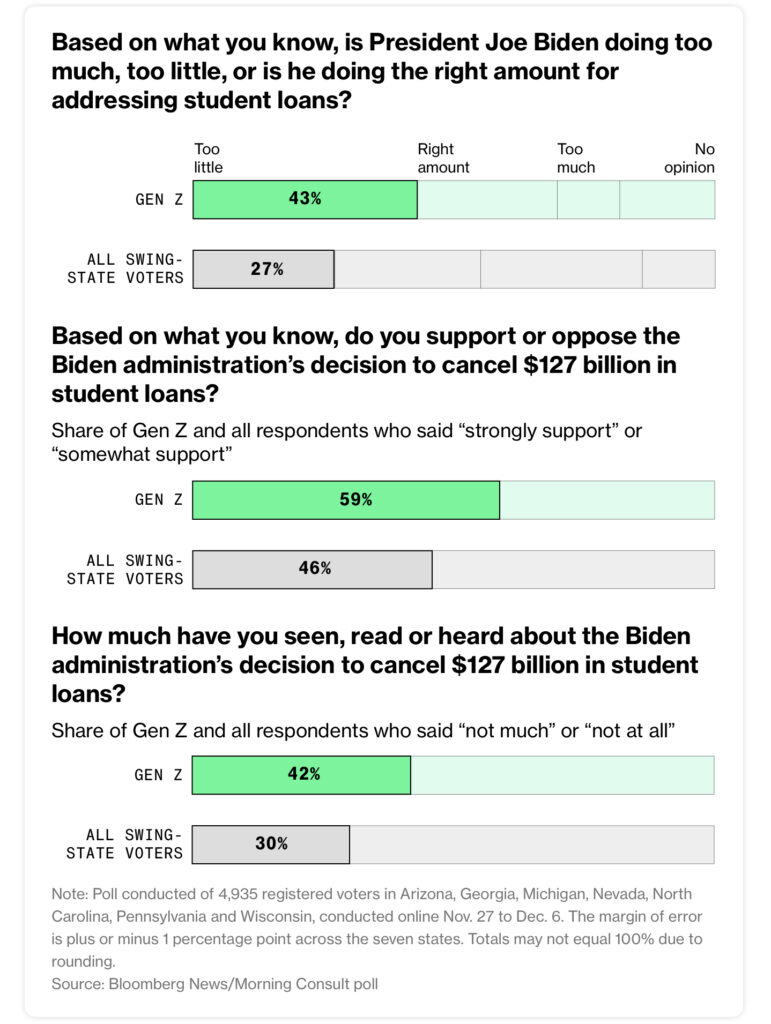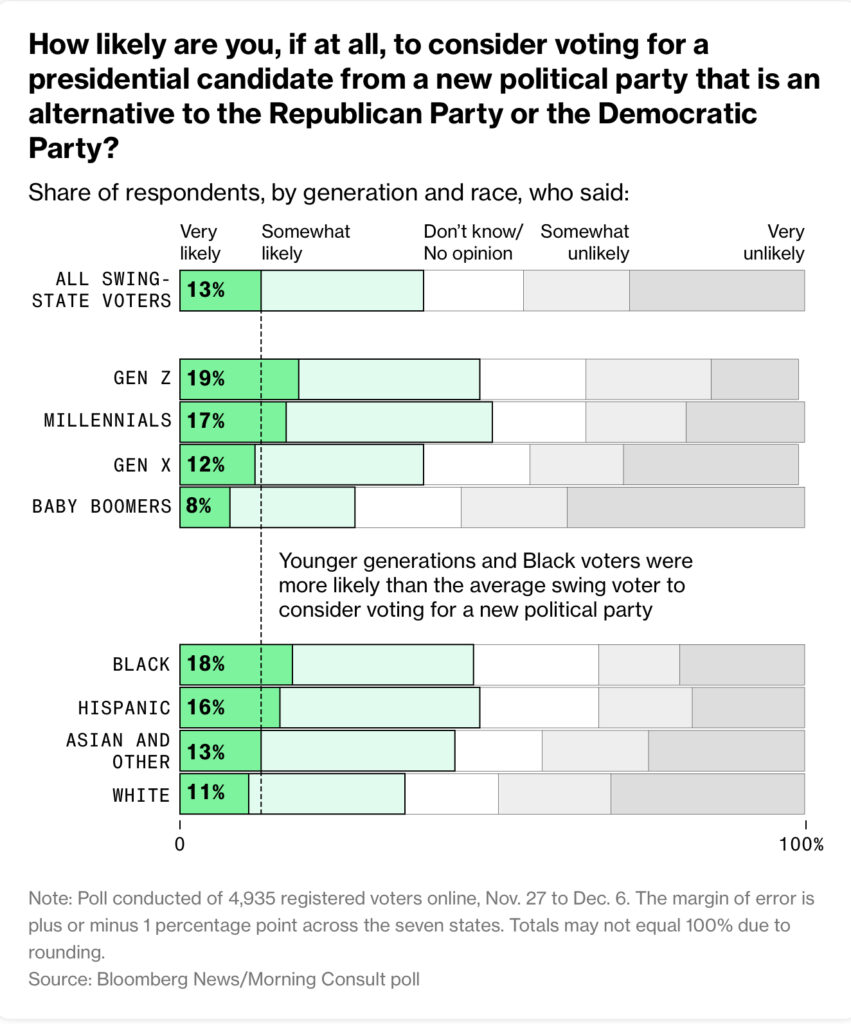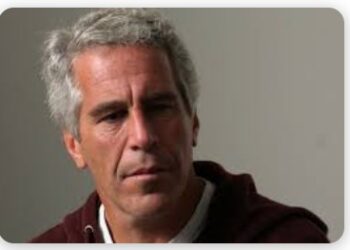President Joe Biden’s efforts to eliminate student-loan debt have not resonated well with young voters in crucial swing states, as indicated by the latest Bloomberg News/Morning Consult poll. Despite erasing $127 billion in student debt, Biden faces challenges in receiving credit from voters, trailing behind former President Donald Trump in a head-to-head matchup across all seven states surveyed. Generation Z voters in swing states believe Biden hasn’t done enough to address student loan burdens, even though they approve of relief measures.
A plurality of Generation X and baby boomer voters feels he has already done too much. Adding to the challenge is the fact that much of the student-loan forgiveness has benefited middle-aged borrowers, making it harder to convince young voters that the policy directly benefits them.

Eleven months ahead of the upcoming election, Bloomberg News/Morning Consult polling reveals that Donald Trump is leading Joe Biden by 5 percentage points among registered voters in a head-to-head competition across seven crucial swing states. While Trump’s lead falls within the margin of error in Arizona, Michigan, Nevada, Pennsylvania, and Wisconsin, it is notably more substantial in Georgia and North Carolina. The poll, with a 1 percentage point margin of error for all seven states collectively and 3 to 5 percentage points for individual states, sheds light on challenges facing the Biden campaign.
Eli Yokley, a US politics analyst at Morning Consult, notes that Biden is not making significant gains among key voter groups crucial for securing victory. Despite maintaining a lead with Generation Z voters overall (44% to 38%), the battleground-state poll indicates that Biden encounters obstacles in promoting his student loan policies.
Interestingly, a substantial portion of swing-state Democrats, approximately one in five, express support for House Republicans’ efforts to initiate an impeachment investigation into Biden. This discontent within his own party is coupled with a growing dissatisfaction among swing-state Democrats, with 23% of those who voted for Biden in 2020 expressing an unfavorable view of him today, compared to 17% of 2020 Trump voters who have soured on the former president.
In response to these challenges, a Biden campaign spokesman, Daniel Wessel, emphasizes their focus on earning every vote and highlighting the differences between what they perceive as the “extreme MAGA agenda” and President Biden’s "popular agenda.” Despite Democrats in Washington dismissing the impeachment investigation as lacking evidence and merit, the House has voted to formalize an impeachment inquiry into Biden, centering around his family’s finances and business dealings.
On the crucial issue of the economy, Biden lags behind Trump, with voters trusting the former president more on various economic matters. Black voters trust in Biden running the economy in particular, has dropped significantly from October. Economists have warned of the dangers of student loan forgiveness adding strains to an already large economic downturn seen under the Biden administration. Michael Jones, the Kautz-Uible Professor of Economics at University of Cincinnati’s Carl H. Lindner College of Business, warned of student loan debt forgiveness furthering inflation. Heritage Foundation reported that taxpayers would spend roughly $500 billion on forgiveness and Biden’s policy would worsen labor shortages.
The Emerson College December report revealed similar data regarding the economy with 38% of all voters citing it as their top issue. Among voters under 30, this concern intensified, with 44% identifying the economy as the most critical problem facing the United States. An open-ended response revealed a potential understanding of their dissatisfaction with Biden’s handling of the economy as terms like ‘inflation,’ ‘economy,’ and ‘money’ dominated the discourse.
The poll also highlights the emergence of third-party candidates, with 13% of swing-state voters expressing a likelihood to consider supporting them. This scenario poses a challenge to both Republican and Democratic voters and widens Trump’s lead over Biden in battleground states when these alternative candidates are included.

The complex landscape revealed by the poll reflects the challenges Biden faces in securing support for his policies, managing dissatisfaction within his coalition, and contending with the appeal of third-party candidates.


![Bannon’s WarRoom, Show Clip Roundup 11/7/2024 [AM]](https://warroom.org/wp-content/uploads/2024/11/WarRoom-Logo-350x234.jpg)

Student debt is a serious problem and not just for the student. It is not in the national interest to overburden young people with unproductive expenses at the start of their productive lives. They should be spending their meager excess cash on houses and families, not supporting a bloated bureaucracy of frauds, groomers, and Commies (but I repeat myself). All debts are paid, to quote Milton Friedman. But by whom? Not the taxpayers. Why should a store clerk who did not have the opportunity to go to college get stiffed for the expense of a degree in women’s studies? Certainly the student should pay because they incurred the debt, but as I have argued above, the burden needs to be reduced. I propose that the bureaucrats get a bill for the relief of debt to many of the debt holders, perhaps through a special student loan provision in bankruptcy laws. If we make the schools pay a part of the student debt claim, even a BIG part, in a bankruptcy settlement, they will be more careful in THEIR spending, their admissions policies, course offerings, and placement services.